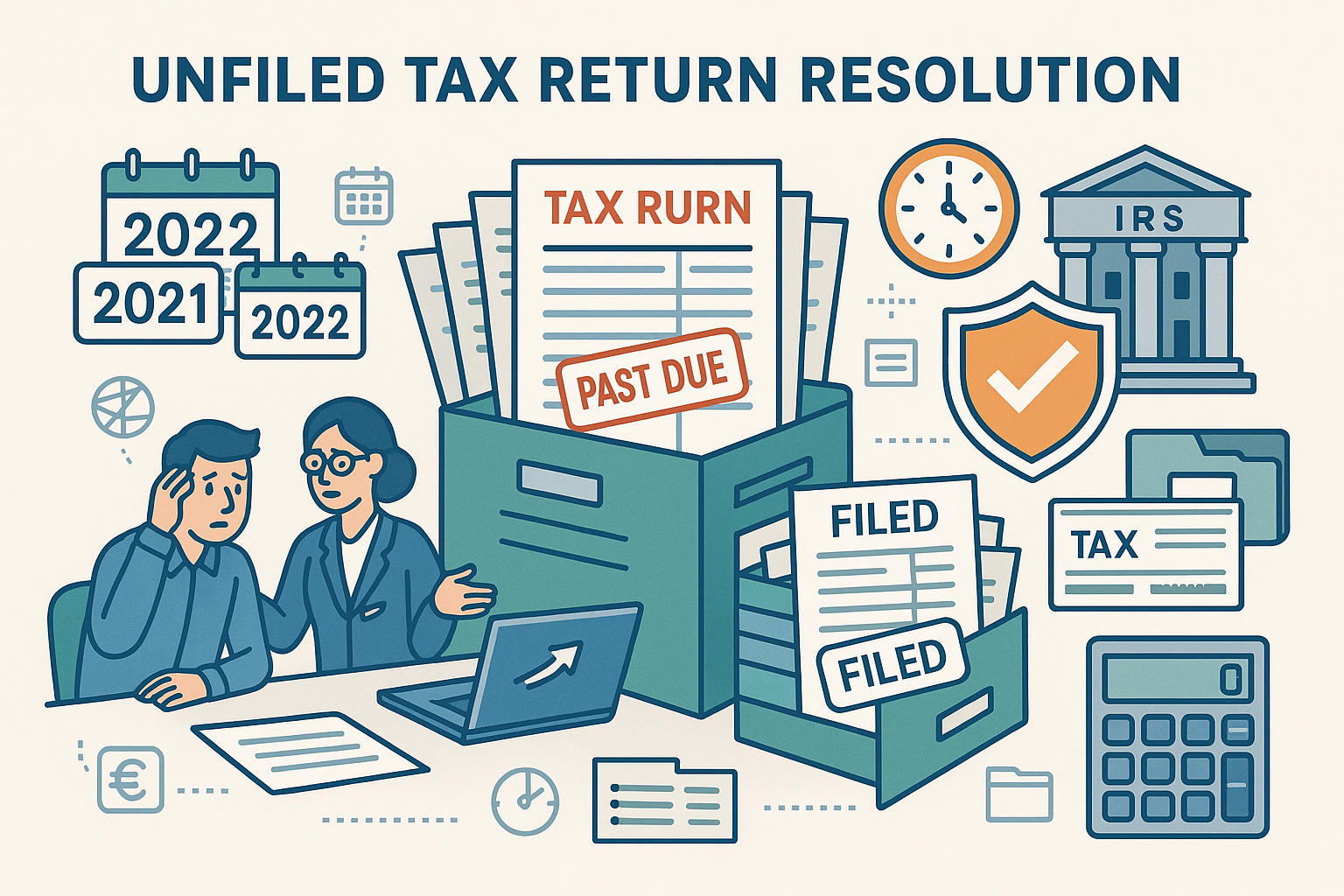



Many taxpayers struggle with an unfiled tax return from previous years due to financial hardship, health problems, or the overwhelming nature of tax forms and paperwork. Unfortunately, delaying action only worsens the situation dramatically. The Internal Revenue Service can impose severe penalties and interest, file a substitute return on your behalf, or even begin aggressive collection process actions against your bank account, wages, or Social Security retirement benefits.
The risks extend far beyond immediate money concerns. You could lose the chance to claim valuable tax credits or refund opportunities, or even have gaps in your income history that significantly affect disability benefits eligibility. Fortunately, there are clear, actionable solutions available. Filing past due returns allows you to regain control, qualify for refunds, and stop the aggressive IRS collection process actions immediately. Our team guides you through completing individual income tax returns accurately and efficiently, helping you resolve unpaid tax balances, protect your future financial opportunities, and restore complete financial peace of mind.
Current Year Priority Filing: Individual taxpayers with recent unfiled tax return obligations can establish a current year priority filing to prevent immediate collection process escalation. These arrangements provide immediate protection from substitute return filings while allowing taxpayers to resolve their tax bill efficiently. The IRS typically processes current-year returns within standard timeframes, and taxpayers can file electronically through approved systems without extensive documentation requirements beyond standard tax documents.
Multi-Year Catch-Up Filing: A comprehensive catch-up filing offers systematic resolution over extended periods for larger unfiled tax return backlogs spanning multiple tax years. These individual income tax returns require more detailed tax document compilation but provide comprehensive protection from collection process actions, including bank account levies. Taxpayers can organize tax forms from multiple years to ensure consistent filing and maintain good standing with their compliance obligations.
Priority Refund Recovery Filing: Priority refund recovery filing offers the most time-sensitive protection because refund opportunities expire permanently after three years from the original due date. The priority refund filing process typically qualifies for expedited processing and provides immediate access to refund funds. Taxpayers can demonstrate refund eligibility through proper tax document submission, ensuring their income tax returns are prioritized before refund deadlines expire.
Electronic Streamlined Filing: Modern taxpayers can establish protection quickly by utilizing electronic filing systems for past due return submissions. The electronic filing system allows immediate processing capabilities and can provide IRS acknowledgment within days of submission. Taxpayers can manage the status of their unfiled tax returns, track the processing progress, or request additional information through secure online portals that streamline the entire resolution process.
Income Threshold Standards: To qualify for various filing solutions, taxpayers must complete accurate income reporting while meeting reasonable documentation standards. Lower-income taxpayers may be eligible for simplified filing procedures or extended deadline considerations. The IRS evaluates each taxpayer's income level to determine appropriate filing requirements that provide tax resolution and maintain compliance standards.
Documentation and Record Limits: Individual taxpayers with various income sources, including tax credits and deduction entitlements, can qualify for streamlined filing options. Those with complex income situations may still be eligible but require more extensive tax documents and supporting records. The IRS considers primary income sources and potential tax credits when determining filing eligibility and refund calculation requirements.
Contacting the IRS immediately after receiving collection notices to file past-due returns is the most effective approach to stopping bank account seizures and wage garnishments. Taxpayers can file electronically for immediate processing or work with tax professionals to expedite unfiled tax return resolution efficiently. Unlike other collection process responses, establishing an active filing status provides immediate protection. It can prevent funds from being seized, preserving access to necessary accounts for Social Security retirement deposits and daily expenses.
21-Day Protection Window: When collection process actions have begun, filing emergency past due returns within critical timeframes can secure protection and halt aggressive actions. During this essential period, taxpayers can complete individual income tax returns and demonstrate their commitment to resolving unpaid tax obligations through proper filing. The IRS may suspend collection process activities when taxpayers show good faith through immediate tax return submission and proper tax document compilation.
Direct Filing Options: Emergencies allow taxpayers to file individual income tax returns and establish ongoing compliance simultaneously. Options include electronically submitting complete tax forms, comprehensive tax document packages, or direct IRS contact to demonstrate immediate compliance commitment. Completing accurate income tax returns while providing thorough documentation shows the IRS that taxpayers are serious about resolving their tax obligations and can justify halting collection process actions.
Multi-Year Filing Structure: Standard multi-year filing agreements protect the collection process through systematic past due return submissions that satisfy IRS compliance requirements. Taxpayers can file individual income tax returns based on their income documentation availability, with minimum filing requirements determined by tax year obligations and available tax documents. These agreements resolve penalties and interest accumulation while ensuring proper income reporting for Social Security credit purposes.
Electronic Filing Advantages: Enrolling in electronic filing systems provides additional benefits, including faster processing times and enhanced refund processing capabilities. Electronic tax return submissions ensure accuracy and reduce the risk of processing delays that could affect refund timing. The IRS views electronic filing favorably and may offer expedited processing to taxpayers who complete their unfiled tax return obligations through approved electronic systems.
Business vs. Individual Filing Strategies:
Successful past due return filing preserves access to essential refund opportunities while creating a structured tax resolution. Submitting individual income tax returns through proper filing allows taxpayers to maintain their financial condition while potentially reducing unpaid tax obligations through legitimate deductions and tax credits. Properly completed income tax returns ensure compliance and demonstrate good faith, often leading to favorable IRS consideration and reduced penalties and interest accumulation.
Maintaining a current tax return file helps avoid long-term financial damage while rebuilding credit and strengthening Social Security benefit eligibility. Consistent individual income tax returns filing creates predictable compliance patterns and prevents aggressive collection process actions that can damage credit scores. Taxpayers with a successful filing compliance history may qualify for favorable consideration in payment plan options, further improving their financial condition and relationship with the IRS.
Complex cases involving multiple tax years, business obligations, or disputes over penalties and interest calculations may require professional guidance from experienced tax professionals. Tax professionals understand IRS filing requirements and can negotiate favorable terms, including penalty reductions or extended filing deadlines. They can also help coordinate tax document compilation with past-due return submissions and ensure optimal refund recovery strategies.
The IRS provides comprehensive self-service options for taxpayers to file past-due returns independently. Taxpayers can access tax forms through the IRS website, complete their income tax documentation to support filing applications, and submit tax documents without professional assistance. The filing system provides structured processing and can establish compliance within standard submission timeframes.
You can file past due returns immediately upon recognizing unfiled tax return obligations. Individual income tax returns that include complete tax documents and accurate income reporting are typically processed within the standard IRS timeframes for compliance recognition. Emergency filings can receive expedited consideration, especially when you complete accurate tax forms and demonstrate a genuine commitment through comprehensive tax document submission and proper income reporting.
Yes, taxpayers with ongoing past-due return obligations can request modifications based on changes in their income or tax document availability. You can adjust filing priorities, provide additional information about income sources, or update tax documents through direct IRS contact. Lower-income taxpayers may qualify for simplified filing procedures or additional consideration while maintaining collection process protection.
IRS acceptance of individual income tax returns doesn't eliminate correction opportunities for legitimate errors. However, taxpayers can often request amendments by providing corrected tax documents, revised income information, or addressing specific calculation errors through proper amendment procedures. Completing improved tax forms prevents future complications and maintains opportunities for accurate refund processing. If you anticipate correction needs, contact the IRS immediately to address concerns rather than allowing incorrect tax returns to remain uncorrected.
Filing past due returns typically restores eligibility for legitimate tax credits and refund opportunities within statutory deadlines. Proper filing may qualify taxpayers for a complete refund recovery and tax credits beyond basic tax resolution. While some refund opportunities may expire during delayed filing, a successful past due return submission generally restores eligibility for most available tax credits. It ensures proper income crediting for Social Security benefit calculations.
Yes, the IRS allows comprehensive past due return filing for multiple tax years and various tax obligations simultaneously. In coordinated filing efforts, individual taxpayers can include all outstanding unfiled tax return obligations, including potential refund years. This comprehensive approach provides collection process protection for all covered tax years and simplifies tax compliance into a systematic filing completion that addresses all outstanding obligations efficiently.
Past due return protection begins immediately upon filing and becomes permanent upon IRS processing and acceptance. This means completing accurate individual income tax returns, maintaining compliance with current tax obligations, and meeting filing requirements properly. Protection continues indefinitely once tax returns are correctly processed, providing comprehensive security for your financial condition and ensuring proper income crediting for Social Security and disability benefits calculations.
Methods of Contact
Vital for collaboration, support, or information exchange.